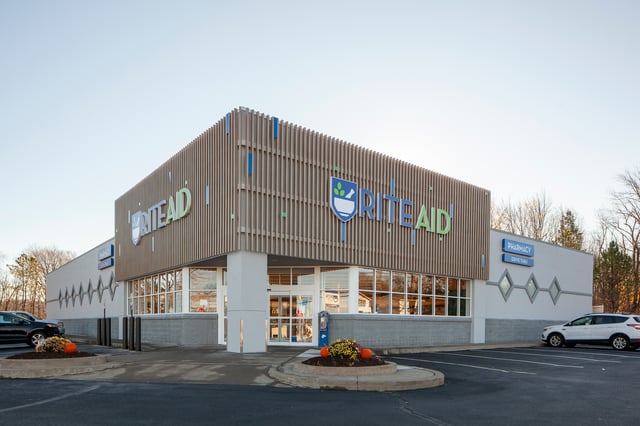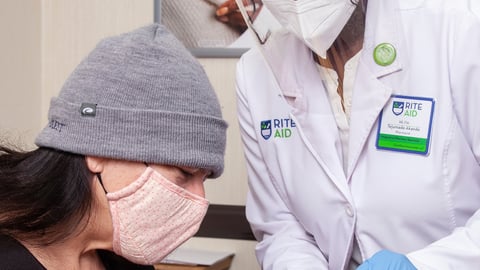Rite Aid Significantly Narrows Loss in Q1
For its first fiscal quarter ended May 29, Rite Aid Corp. reported a net loss from continuing operations of $13.1 million, or 24 cents per share, compared with last year’s first-quarter net loss from continuing operations of $72.7 million, or $1.36 per share. The company attributed this significant improvement in net loss primarily to better operating results in its retail pharmacy segment, higher intangible asset impairment charges in the prior-year first quarter, and lower restructuring-related costs due to the merchandise optimization program that it rolled out last year.
The company also reported adjusted net income from continuing operations of $20.9 million, or income of 38 cents per share, and adjusted EBITDA from continuing operations of $138.9 million, or 2.3% of revenues, versus last year’s first-quarter adjusted EBITDA of $107.4 million or 1.8% of revenues. This improvement was because of an increase in gross profit resulting from an increase in prescription volume in the retail pharmacy segment, according to Rite Aid.
The company’s revenues from continuing operations were $6.16 billion, compared with $6.03 billion in the prior year’s quarter. Rite Aid said that the 2.2% increase in revenues was driven by growth in the retail pharmacy segment, partly offset by a decline in its pharmacy services segment.
“We are pleased with our first-quarter results, as we delivered adjusted EBITDA at the top end of our guidance range and continued our extraordinary efforts to vaccinate Americans against COVID-19,” noted Rite Aid President and CEO Heyward Donigan. “As a result of the tireless efforts and dedication of our teams, I am proud to announce that we delivered nearly 4.7 million COVID-19 vaccines in the first quarter. We have now provided over 6 million COVID-19 vaccines since we began administering shots late last fiscal year.”
Added Donigan: “Our results improved sequentially through the first quarter, and we have momentum in several areas of our business as the country began taking meaningful steps towards a post-pandemic world. With a healthier economy and the reopening of the communities we serve, combined with the execution of our RxEvolution strategy, we are well positioned to deliver on our strategic priorities. I am very proud of our over 50,000 associates and the progress we’re making in our journey to revitalize our brand and elevate the crucial role that pharmacy plays in the health of our customers.”
Rite Aid’s retail pharmacy segment revenues from continuing operations grew 5.5% over the prior-year quarter, due to an increase in same-store sales and the inclusion of results from recently acquired Bartell Drugs in the quarter. Q1 same-store sales from continuing operations rose 1.4% from the prior-year period, consisting of an 8.2% increase in pharmacy sales and a 12.0% decline in front end sales. Front end same-store sales, excluding cigarettes and tobacco products, fell 11.5%, caused by decreases in sales of general cleaning products, sanitizers, wipes, paper products, liquor and over-the-counter products snapped up during the pandemic-driven surge in the prior-year quarter.
The number of prescriptions filled in same stores, adjusted to 30-day equivalents, grew 11.2% from the prior-year period. As well as the benefit from COVID-19 vaccinations, other acute prescriptions increased 3% and maintenance prescriptions were up 2% on a same- store basis. Prescription sales from continuing operations made up 68.9% of Rite Aid’s total drug store sales.
The segment adjusted EBITDA from continuing operations was $94.9 million, or 2.2% of revenues, for the first quarter compared with $63.0 million, or 1.5% of revenues, in the prior-year period. This improvement was attributed to an increase in gross profit resulting from higher pharmacy same-store sales, partly offset by pharmacy reimbursement rate pressures that weren’t fully offset by generic drug cost reductions and a decline in front end gross profit as the company cycled the impact of last year’s COVID-19 buying surge.
Meanwhile, Rite Aid’s Q1 pharmacy services segment revenues were $1.9 billion, a 5.3% decline from the prior-year quarter. The company said that this was primarily because of the loss of a large customer account, and a drop in Medicare Part D membership.
The segment’s adjusted EBITDA from continuing operations was $44.0 million, or 2.3% of revenues, for the first quarter, flat to last year’s $44.4 million, or 2.2% of revenues. According to Rite Aid, improvements in its discount card business and good network management were offset by the decline in revenues and an increase in the medical-loss ratio connected with the company’s Medicare Part D business.
For fiscal 2022, Rite Aid expects total revenues to be between $25.1 billion and $25.5 billion, net loss between $175 million and $138 million, adjusted EBITDA between $440 million and $480 million, adjusted net loss per share between 79 cents and 24 cents, and capital expenditures of about $300 million.
The company also released its third annual corporate sustainability report, in which it detailed its enhanced environmental, social and governance (ESG) strategy and introduced four key pillars underpinning its sustainability efforts: building a thriving planet, thriving business, thriving workplace and thriving community.
“As a health care organization that aspires to support the whole health of its communities, we understand the critical need to address notable issues like climate change, product safety, energy management and health inequities,” said Trent Kruse, Rite Aid’s SVP, investor relations and treasury. “Our third annual sustainability report illustrates the progress we’ve made across critical ESG initiatives, and lays out a new framework for our sustainability efforts focused around four key pillars. We are pleased with our progress, and look forward to continuing to elevate our efforts around each pillar as we carry out our RxEvolution strategy.”
Launched last year, RxEvolution is the company’s strategy for a revitalized retail experience.
Among the report’s highlights, Rite Aid partnered with 3 Phases Renewables to provide 50% renewable power for select stores in Southern California; launched more than 278 own-brand items free of chemicals of high concern, and reformulated more than 60 items to eliminate these chemicals; hired a VP of diversity, equity and inclusion to develop a DEI Center of Excellence and integrated organizational DEI strategy; and, as of May 29, has administered more than 5 million COVID-19 vaccines.
The report was prepared using guidance from the San Francisco-based Sustainability Accounting Standards Board, along with feedback from key internal and external stakeholders.
Operating more than 2,500 retail pharmacy locations across 17 states, Camp Hill, Pa.-based Rite Aid is No. 19 on The PG 100, Progressive Grocer’s 2021 list of the top food and consumables retailers in North America.






